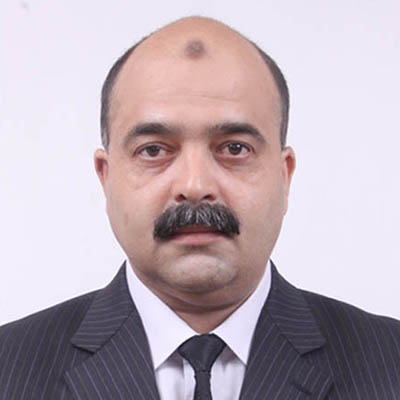
Despite the presence of many medical schools, colleges, and universities, a unified platform was absent where a valuable knowledge base from the entire health sector is coordinated, collated, analyzed, stored, directed, and shared. The research/knowledge being produced at the national level is fragmented, piecemeal, and disjointed. The Center for Health Policy & Innovation at the Sustainable Development Policy Institute (SDPI) was initiated as necessitated by the COVID-19 pandemic. Earlier, our linkages with academic institutions and universities in the health sector were also minimal. That deprived the stakeholders of cutting-edge knowledge being produced by academia and possibility packages it for policymakers; besides also informing our advocacy program on health policy.
Additionally, there was a lack of policy research think tanks focusing on the health sector. This deficit was often echoed by the Ministry of National Health Services, Regulation and Coordination as well.
Center for Health Policy and Innovation encompasses a wide variety of national, regional, and international organizations and academic institutions. The foundation stones of the center were laid on the contextually organized and created evidence-based knowledge. The research includes, but is not limited to communicable, non-communicable, and incidental diseases. The prevention, preemption, and elimination strategies are the recipients of focal attention, and policy recommendations are fed into the concerned ministries and institutions.
More importantly, the Center for Health Policy & Innovation addresses issues arising out of the COVID-19 crisis and to respond most pressing health issues in Pakistan. Events arising from COVID-19 point towards the need for a dedicated window within SDPI that could maintain institutional memory of our work with the federal Cabinet, ministries, and provincial departments.
Disparities in health care and lack of access to care in inner cities and remote areas result in poor health outcomes. In multiple studies across Pakistan, it is unanimously pointed out that there is a lack of informed and fair policy decisions at the national level, claiming an immense need to increase the pace of research on the health sector. Health has been devolved to the provinces in the 18th Amendment, and in this regard, SDPI’s center liaises with the provincial governments and looks for opportunities to work in sub-national health policy space.
Advancement in health information technology can enable a transformation in health research that could facilitate studies that were not financially feasible in the past, and thus provide new insights regarding emerging health issues like COVID-19. Sufficient data regarding health interventions and outcomes is hardly available in the country. Structured information which may be electronically exchanged throughout the health care continuum is the need of the hour. That research may be effectively used in the health care system for individuals and populations at a mass.
Science is changing more rapidly and becoming more complex, necessitating collaboration at the individual as well as organizational levels. Thus, information sharing between institutions has become more important compared to previous eras.
Mission/Roles
Drawing from the SDPI’s core mission statement, this center works for the enhancement of health and well-being within and across generations in Pakistan, regionally, and globally. The center formulates a valuable knowledge base, where the entire health sector is engaged and knowledge is created, coordinated, collated, analyzed, stored, directed, and shared for informed policy decisions. The center acts as the generator of original research on health issues and an unprecedented information resource for concerned individuals and institutions. The center embraces two-fold functions: an advisory role fulfilled through research, policy advice, and advocacy; and an enabling role realized through providing other individuals and organizations with resource materials and training.
SDPI’s On-Going Activities in the Health Sector
Sustainable Development Policy Institute, under its health theme, is addressing one of the most pressing health issues in Pakistan – Tobacco endemic. The Rampant use of tobacco and tobacco products in Pakistan is on the increase. An estimated 24 million smokers use more than 85 billion tobacco sticks every year, not to mention the use of smokeless tobacco products. Multiple organizations are endeavoring to harness the issue and address the ever-increasing burden on health because of tobacco. Despite the existence of a Tobacco Control Cell (TCC) at the Ministry of National Health Services Regulation and Coordination (MoNHSRC), the tobacco industry continues to grow and strangulate the governmental policies curtailing tobacco use. Besides this, the efforts by Civil Society are fractured and fragmented. SDPI’s efforts for Tobacco Control would be instrumental in synergizing the efforts of all Civil Society organizations and making concrete recommendations to the Federal government addressing the issue. It is in this purview that the Sustainable Development Policy Institute (SDPI) plans to establish the Center for Health Policy & Innovation.
Objectives
SDPI Network:
SDPI has a Memorandum of Understating with more than a hundred institutes nationally and across the globe. Its vast network of partners also includes the Parliament of Pakistan and for knowledge partnerships, SDPI is engaged with the Higher Education Commission and a score of universities. The institute ushers in a new era of better research options for both health practitioners and policymakers. World Health Organization Pakistan, the Tobacco Control Cell of the Ministry of National Health Services Regulations and Coordination, The Network for Consumer Rights Protection, and Collation for Tobacco Control are currently engaged with SDPI in different health assignments.
Activities:

Senior Research Associate

Visiting Researcher
The Centre for Learning and Development (CLD) at SDPI is aimed at strengthening the capacities of civil society organizations, private sector organizations, academia, and policy research institutions for sustainable development. The Centre believes in participatory and interactive approaches for mutual learning about institutional capacities, building strategies for transforming human resources, applied research, and good governance to improve systems for durable solutions. Any activity aimed toward mutual learning helps to ensure a combination of knowledge management and action research through reflective learning experiences, which may or may not be successful. This is very important in how institutional leadership transforms learning processes for organizational capacity development to reflect improved results for the desired impacts.
The SDPI Centre for Learning and Development has achieved the unique status of transforming institutional leadership for quality enhancement through multi-dimensional learning methodologies. Effective assimilation techniques are part and parcel of SDPI’s learning and development programs. CLD has achieved another milestone by launching an international training program in collaboration with International Development Research Centre (IDRC), a premier Canadian Government supported Canadian Institute. CLD-SDPI is now an official partner of IDRC for conducting international training workshops on leadership, change management, impact evaluation, quality assurance, governance, and other relevant areas for the world’s top-ranked think tanks working across Southeast Asia and the Pacific Region.
Since its inception, till date, CLD has conducted more than 1500 training workshops, trained more than 15000 professionals in various categories from more than 650 development organizations, academia, research institutions, industry, and the corporate sector. Conducted many of customized workshops on research quality, faculty development, leadership, and team building, organizational performance, community development and change management, research and proposal writing, project management and impact evaluation, and many other relevant areas for research and academic institutions, as well as national, international and UN organizations, including, Fred Hollows Foundation (FHF), Australia, United States Educational Foundation, Pakistan (USEFP), British Council, DFID, USAID, UKAID, USAID, GIZ, UNESCO, UNODC, UNDP, UNICEF, and many other similar organizations. A brief summary of the relevant organization is attached in Annexures.
Vision
To be a centre of excellence in generating and disseminating research based knowledge to strengthen SDPI’s brand and to remain relevant to our beneficiaries.
Mission
To become a quality training organisation through a high performing team to contribute and for the successful attainment of SDPI’s mission.
Objective
To design, conduct and market at least 20 short training courses (generic, research based and specialized) every year by addressing the needs of potential clients.
© 2026 SDPI. All Rights Reserved Design & Developed by NKMIS WEB Unit